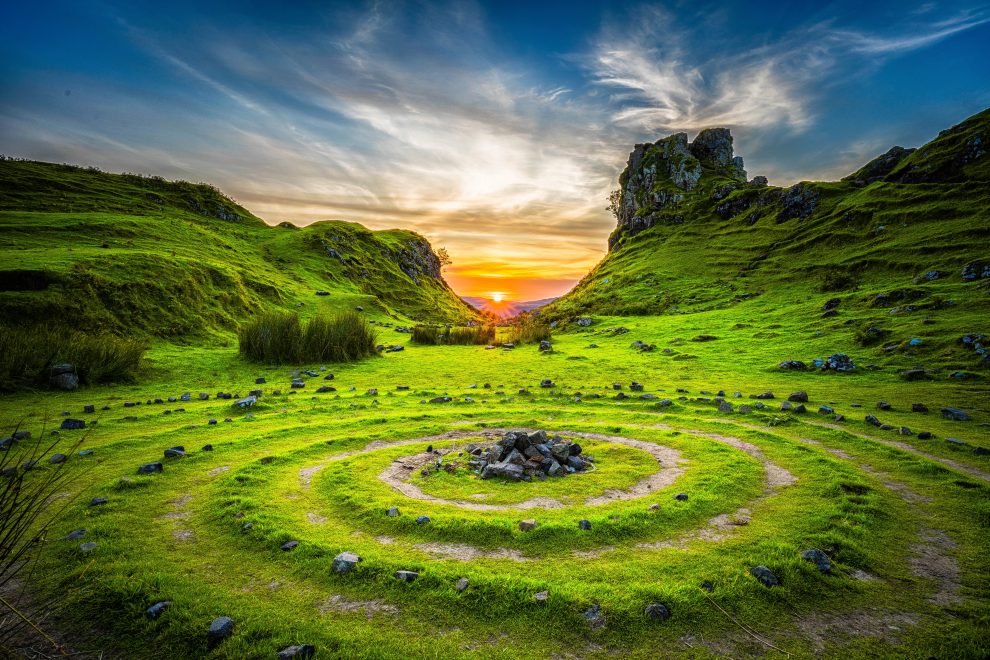The Earth is warming and we are responsible. This is the undeniable conclusion reached by 2,000 scientists and policy experts contributing to the United Nations’ Intergovernmental Panel on Climate Change, the winners of the 2007 Nobel Peace Prize along with Al Gore.
The U.S. Catholic bishops have accepted this fact as well. “In facing climate change, what we already know requires a response; it cannot be easily dismissed,” the bishops said in their 2001 statement on global climate change. “Significant levels of scientific consensus . . . justify, indeed can obligate, our taking action intended to avert potential dangers.”
What do we, as Catholics, have to offer in the face of unstable climates? Of course we can reduce, reuse, and recycle. Another bright idea: Change your lightbulbs. These small steps, though, are just the beginning. Our faith asks us to live intentionally, aware of our relationship to the natural world.
The Bible teaches us that we are stewards of God’s covenant with all living things. Our Catholic spiritual traditions give us inspiration for caring for rather than consuming creation. Catholic social teaching reminds us of the least among us while we seek political solutions. And even the smallest of actions are contagious when we share ideas within supportive parish communities and families.
Our faith is more than a set of guidelines, so our 41 ways to save the Earth are more than just actions. Our ways ask that you learn about the issues and contemplate creation. We hope they inspire you to further action.
10 ways parishes can save the Earth
1. Conduct an energy audit of your parish’s buildings. To arrange one, contact your local Interfaith Power and Light group or your utility company or find guidelines for a do-it-yourself audit at energystar.gov/congregations.
2. Form an eco-spirituality team to study environmental issues, help educate other parishioners, and create an action plan.
3. Ask your pastor to talk about care for creation and climate change in his homilies.
4. Ask youth groups and school kids to conserve energy by recycling their homework papers, taking shorter showers, and so on.
5. Research local experts (activists, farmers, meteorologists, scientists) who can speak about environmental issues specific to your geographic area. Join with other faith communities to sponsor a speaker series.
6. Provide outdoor spiritual opportunities—retreats, days of reflection, prayer services—to nurture spiritual connections with creation.
7. Team up with local farmers and invite growers to sell their wares after weekend Masses, or offer your parish as a drop-off/pick-up location for a community-supported agriculture (CSA) program. Learn more at localharvest.org.
8. Feature simple energy-saving tips in your bulletin.
9. Getting ready to renovate? Explore how you can dispose of building materials in environmentally responsible ways. Build with recycled materials whenever possible, and purchase Energy Star appliances for parish buildings.
10. Take time during Mass to pray for the poor and vulnerable, especially those in developing nations, who suffer disproportionately from the effects of global warming.
5 Bible passages to help Catholics save the Earth
11. Genesis 1:1–2:4a—The first creation story shows the interdependence of natural creation and identifies human beings as “images of God.”
12. Genesis 2:4b–23—The second creation story emphasizes human beings as made of the substance of the Earth, as are all other living creatures. The human creature is placed in the garden to serve (the same verb as “till”) and guard it.
13. Hosea 2:20—The prophet offers a poetic description of the reestablishment of the
covenant after it was broken by human sin.
14. Romans 8:19–22—Paul says the final transformation will include all of creation, not take place apart from it.
15. Revelation 21:1–5a—The vision of the future indicates that at the end, the Earth will be transformed, not destroyed.
6 websites to help Catholics save the Earth
16. Find out what Catholics are doing at Catholic Climate Covenant.
17. Read the U.S. bishops’ statement on climate change: “Global Climate Change: A Plea for Dialogue, Prudence, and the Common Good.”
18. Sign up to see what the church is telling the state through letters, testimony, and action alerts.
19. Take action by joining your diocesan or state Catholic conference legislative network. Find state conferences at nasccd.org.
20. Know political candidates’ positions, both in national and local elections.
21. Learn about public policy on climate change.
10 spiritual ways to save the Earth
22. Upon waking thank God for the gift of our daystar, Brother Sun.
23. Spend time each day or week with one tree or stone and listen.
24. Walk mindfully each day without headphones.
25. Take public transportation to work and consider the time a mini-retreat for meditation and prayer.
26. Bake bread as a retreat activity, reflecting upon each ingredient.
27. Before drinking a glass of water say, “Be praised, my God, for Sister Water.”
28. Prepare and eat a meal with others at home in a sacramental manner.
29. Walk with children and share the wonder of creation and the Creator.
30. Commit to one action for the Earth that evolves from prayer and contemplation.
31. Silently greet each rain drop, child, tree, and element as sister and brother.
10 ways Catholic families can save the Earth
32. Buy different napkin rings (at the secondhand store, of course) for everyone in the family and use cloth napkins.
33. Use cloth grocery bags.
34. Walk or bike instead of drive whenever possible. (It’s more often than you think.)
35. Buy organic food, especially milk, if you can afford it.
36. Eat less meat and more fresh fruits, vegetables, and grains.
37. Compost your garbage.
38. Use a rain barrel to collect water for your garden.
39. Reduce your use of small plastic storage bags (and reuse the ones you do). Use reusable storage containers instead.
40. Try buying secondhand clothes.
41. Read books and magazines devoted to sustainable living for inspiration, motivation, and encouragement.
Photo by Robert Lukeman on Unsplash














Add comment